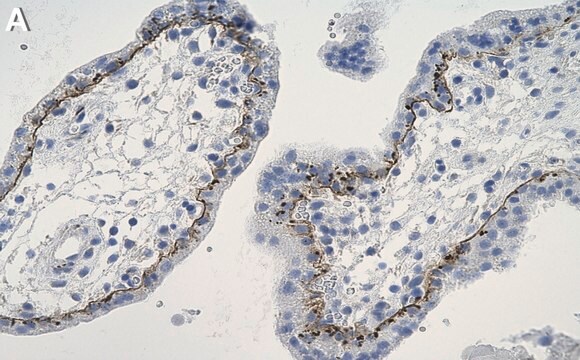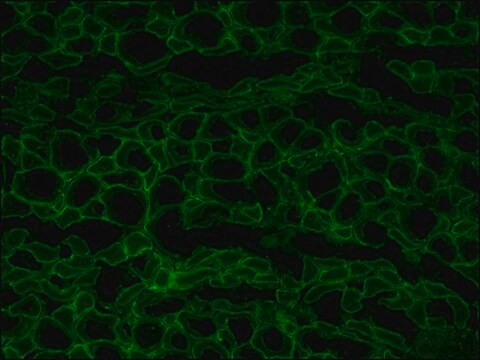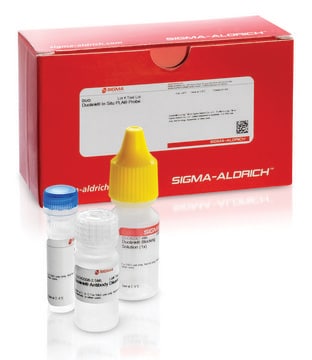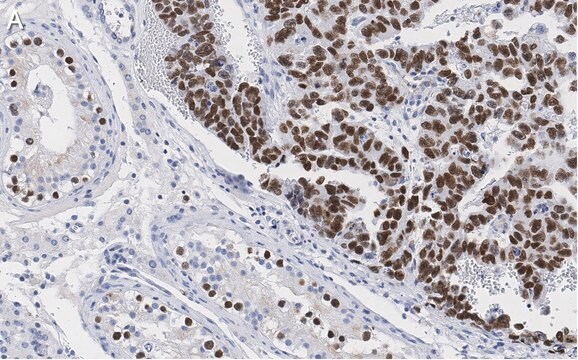General description
We are committed to bringing you greener alternative products, which adhere to one or more of The 12 Principles of Green Chemistry.This antibody is Preservative-free, produced without the harm or sacrifice of animals and exceptionally stable to allow for ambient shipping and storage if needed and thus aligns with "Waste Prevention", "Designing Safer Chemicals" and "Design for Energy Efficiency".
Click here for more information.
ZooMAb antibodies represent an entirely new generation of recombinant monoclonal antibodies.
Each ZooMAb antibody is manufactured using our proprietary recombinant expression system, purified to homogeneity, and precisely dispensed to produce robust and highly reproducible lot-to-lot consistency. Only top-performing clones are released for use by researchers. Each antibody is validated for high specificity and affinity across multiple applications, including its most commonly used application. ZooMAb antibodies are reliably available and ready to ship when you need them.
Specificity
Clone C26 is a ZooMAb® mouse recombinant monoclonal antibody that specifically detects Dystrophin. It targets an epitope from the internal region.
Immunogen
TrpE-tagged recombinant fragment corresponding to 110 amino acids from the internal region of human Dystrophin (from the Exon 43-coded pectrin-like repeat 16 region).
application
Quality Control Testing
Evaluated by Western Blotting in Human Skeletal Muscle tissue lysate.
Western Blotting Analysis: A 1:10,000 dilution of this antibody detected Dystrophin in Human Skeletal Muscle tissue lysate.
Western Blotting Analysis: A 1:10,000 dilution from a representative lot detected Dystrophin in Human heart tissue lysate.
Immunohistochemistry (Paraffin) Analysis: A 1:100 dilution from a representative lot detected Dystrophin in human skeletal muscle tissue sections.
Immunofluorescence Analysis: A 1:100 dilution from a representative lot detected Dystrophin in human skeletal muscle tissue sections.
Note: Actual optimal working dilutions must be determined by end user as specimens, and experimental conditions may vary with the end user
Anti-Dystrophin, clone 2C6 (MANDYS106) ZooMAb®, Cat. No. ZMS1051, is a recombinant Mouse monoclonal antibody that specifically targets Dystrophin and is tested for use in Immunofluorescence, Immunohistochemistry (Paraffin), and Western Blotting.
Target description
Dystrophin (UniProt: P11532; also known as DMD) is encoded by the DMD gene (Gene ID: 1756) in human. Dystrophin is a rod-shaped cytoplasmic protein and a vital part of a protein complex that connects the cytoskeleton of a muscle fiber to the surrounding extracellular matrix through the cell membrane. It is expressed in muscle fibers accumulating in the costameres of myoplasm at the sarcolemma. Its expression is also reported in brain, muscle, kidney, lung and testis. Dystrophin is localized to the inner part of the muscle fiber cell membrane (sarcolemma), where it forms the dystrophin-associated glycoprotein complex (DGC) that links the extracellular matrix to the actin cytoskeleton. The N-terminus is the actin-binding domain, and the carboxy-terminal domain interacts with beta-dystroglycan as well as dystrobrevin and the syntrophin. The central rod domain that comprises the major mass of the dystrophin molecule forms a flexible, rod-shaped structure. Dystrophin plays an important role in stabilizing the muscle fiber against the mechanical forces of muscle contraction by providing a shock-absorbing connection between the cytoskeleton and the extracellular matrix. The DMD gene is the largest known gene in humans and mutations in this gene are known to cause Duchenne muscular dystrophy, a sex-linked recessive disorder that affects males aged 3 to 7 year as proximal muscle weakness with steady progression. This ZooMAb® recombinant monoclonal antibody, generated by our propriety technology, offers significantly enhanced specificity, affinity, reproducibility, and stability over conventional monoclonals.
Physical form
Purified recombinant mouse monoclonal antibody IgG, lyophilized in PBS, 5% Trehalose, normal appearance a coarse or translucent resin. Contains no biocide or preservatives, such as azide, or any animal by-products. Larger pack sizes provided as multiples of 25 μL.
Reconstitution
Reconstitute lyophilized antibody pellet with 25μL of ultrapure water or Phosphate Buffered Saline (PBS). Please refer to our
reconstitution protocol and the specific application guidance on the suggested starting dilutions and sample type.
Storage and Stability
Recommend storage of lyophilized product at 2-8°C; Before reconstitution, micro-centrifuge vials briefly to spin down material to bottom of the vial; Reconstitute each vial by adding 25 μL of filtered lab grade water or PBS; Reconstituted antibodies can be stored at 2-8°C, or -20°C for long term storage. Avoid repeated freeze-thaws.
Legal Information
ZooMAb is a registered trademark of Merck KGaA, Darmstadt, Germany
Disclaimer
Unless otherwise stated in our catalog or other company documentation accompanying the product(s), our products are intended for research use only and are not to be used for any other purpose, which includes but is not limited to, unauthorized commercial uses, in vitro diagnostic uses, ex vivo or in vivo therapeutic uses or any type of consumption or application to humans or animals.










